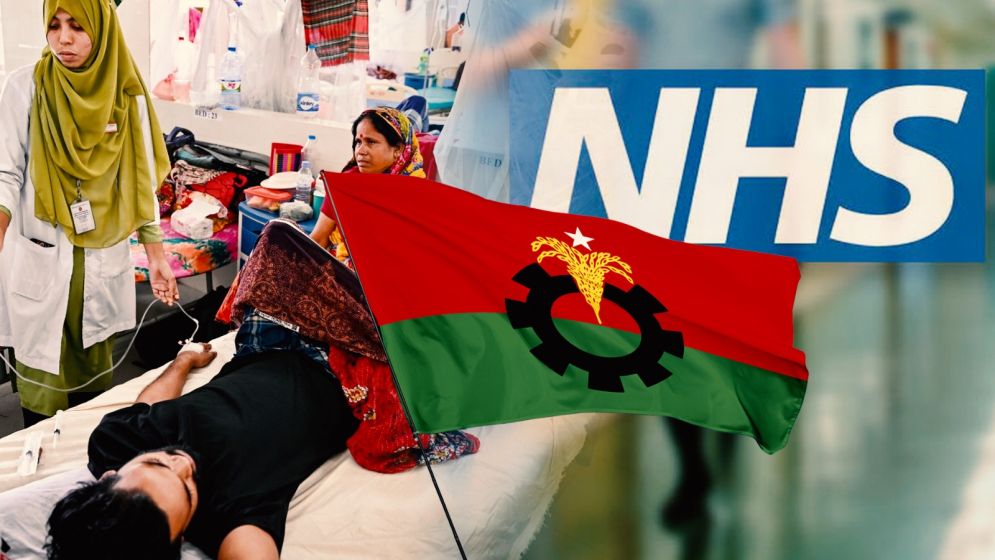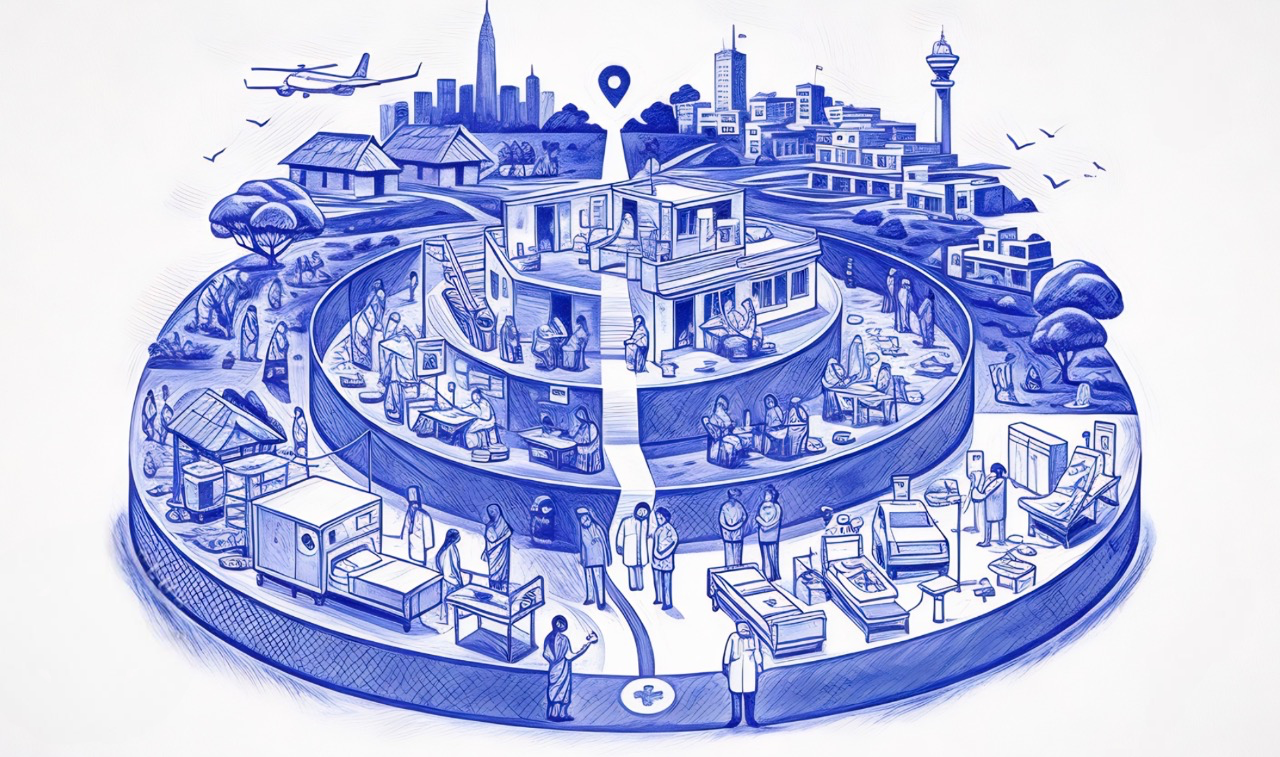A bold healthcare overhaul: BNP's plan for Bangladesh, based on the NHS model of the UK

Despite some recent strides, Bangladesh’s healthcare system remains mired in deep structural challenges, leaving millions of citizens without adequate medical care.
Chronic issues such as a woeful doctor-patient ratio, overwhelmed hospitals, and a heavy reliance on costly out-of-pocket expenses continue to plague the system.
In light of these persistent gaps, the Bangladesh Nationalist Party (BNP) has proposed a bold and visionary solution: a healthcare model inspired by the United Kingdom’s National Health Service (NHS).
If implemented, this transformative idea has the potential to reshape the healthcare landscape, making it more accessible, affordable, and equitable for all Bangladeshis.
At the core of the NHS model is the principle of universal healthcare—a system where every citizen, regardless of their income or social status, has access to essential medical services.
This could be a game-changer for Bangladesh. With only seven doctors per 10,000 people—well below the World Health Organization’s recommended threshold of 22.8—access to timely, quality care remains a distant hope for most citizens.
Adopting a universal healthcare system similar to the NHS would guarantee that healthcare is not a privilege for the wealthy but a fundamental right for all.
The BNP’s proposal to introduce a “Health Card” for every citizen could be the first step toward achieving this vision.
Such a system would ensure that every Bangladeshi has access to essential healthcare at no direct cost. This would be a crucial move to reduce the financial burden on families, who currently shoulder 74% of medical expenses out of pocket.
By relieving citizens of the fear of financial ruin in the face of illness, the government could ensure that even the poorest members of society receive timely medical attention.
Perhaps the most revolutionary aspect of the NHS model is its funding mechanism. Rather than relying on individuals to pay at the point of service, the system is funded through general taxation, making healthcare available to everyone regardless of their ability to pay.
In Bangladesh, where private payments often create a significant financial hardship, this shift to public financing would be a vital step toward ensuring that no one is priced out of essential care.
The BNP’s proposal to allocate 5% of GDP to healthcare would significantly increase the funds available to improve services, expand facilities, and hire more healthcare professionals—including doctors, nurses, and technicians.
With sufficient public funding, the government could invest in building a more robust healthcare infrastructure, particularly in rural and underserved areas.
This would also enable better regulation and monitoring of the system, reducing the risk of corruption and ensuring that funds are used efficiently.

Strengthening primary care is the key
A key element of the NHS’s success is its focus on strengthening primary and secondary care. In the UK, most healthcare needs are met at the primary level, where patients receive regular check-ups, preventive care, and treatment for common conditions.
This approach helps prevent overcrowding at tertiary hospitals, which are reserved for more serious or specialized cases.
In Bangladesh, the primary healthcare system remains underdeveloped, and as a result, many people bypass these services in favor of overstretched tertiary hospitals.
This overcrowding leads to long wait times for patients and leaves doctors with little time to provide individualized care.
BNP’s vision of establishing well-equipped primary and secondary healthcare centers across the country would alleviate the pressure on tertiary hospitals while promoting early diagnosis, preventative measures, and timely treatment.
The NHS has long emphasized the importance of addressing non-communicable diseases, mental health, and maternal and child health through preventative and integrative care.
By adopting a similar approach, Bangladesh could significantly improve public health outcomes and reduce long-term healthcare costs.
Currently, much of Bangladesh’s healthcare system focuses on treating diseases only after they have become serious.
This reactive approach drives up treatment costs and strains the healthcare infrastructure. A shift toward prevention, as exemplified by the NHS through vaccination programs, screenings, and public health campaigns, could help Bangladesh tackle the rising burden of preventable diseases.
The BNP’s focus on preventive care—ranging from vaccinations to health education initiatives—would not only improve health outcomes but also ease the financial burden on both patients and the healthcare system.
Additionally, integrating modern technology into the healthcare system could significantly improve the quality of care.
The NHS’s use of electronic health records (EHR) has streamlined patient management, reduced errors, and ensured continuity of care.
In Bangladesh, where healthcare data is often fragmented, the introduction of EHR systems could help create a more coordinated and efficient healthcare system, enhancing communication across various levels of care.
Ultimately, adopting a model like the NHS would allow Bangladesh to build a healthcare system that prioritizes prevention, addresses the full spectrum of public health needs, and provides accessible, affordable, and high-quality care for all.

A transformative plan of healthcare digitalization
Central to BNP’s vision is the introduction of digital health records, which would allow healthcare providers to access patient information instantly, streamlining diagnoses and treatment plans.
This innovation would not only make healthcare delivery more efficient but also facilitate personalized care, as doctors would be able to track patient progress in real-time.
Additionally, digital infrastructure would improve decision-making by providing healthcare professionals with evidence-based data, leading to more coordinated and effective care.
A major issue in Bangladesh’s healthcare system today is the prevalence of unregulated pharmacies and diagnostic centers, which contribute to the spread of counterfeit drugs and substandard medical practices.
By implementing stringent regulations similar to those in the NHS, the BNP aims to establish a framework of oversight that ensures safe, effective medications and high-quality care across the board.
Proper regulation would help eliminate malpractice and restore public trust in the healthcare system. By ensuring that only licensed and accredited providers are allowed to operate, the government could create a safer, more reliable healthcare environment for all.
Another crucial aspect of the BNP’s proposal is expanding social safety nets for the ultra-poor and marginalized groups, ensuring they can access healthcare services without financial hardship.
In Bangladesh, many citizens cannot afford the rising costs of medical care, often delaying or forgoing necessary treatments.
By removing financial barriers for vulnerable populations, the BNP’s approach would align with the NHS’s core principle of providing healthcare for all, regardless of income or social status. This would be a significant step toward social justice and healthcare equity in the country.
The BNP’s vision for reforming Bangladesh’s healthcare system is a comprehensive, forward-thinking plan that addresses the root causes of the country’s healthcare challenges.
From inadequate access to care, to financial barriers, to the lack of regulation, this proposal tackles the critical issues that have hindered progress for years.
By prioritizing universal healthcare coverage, strengthening primary care, investing in preventive services, and incorporating digital technologies, Bangladesh can build a healthcare system that is both equitable and efficient.
Though the path to reform will undoubtedly face obstacles, the BNP’s proposal provides a clear, practical roadmap for overcoming them.
With the right political will, adequate funding, and a long-term commitment to public health, the vision of a Bangladesh with universal, high-quality healthcare is within reach.
In adopting the NHS model, the BNP is not simply proposing a new healthcare system—it is laying the foundation for a healthier, more prosperous future for millions of Bangladeshis.
The time to act is now. This is the blueprint for a better Bangladesh.
—
Jobayer Hossain is the Country Coordinator for Malaysia & Singapore, Amnesty International UK. You can reach him at [email protected]

